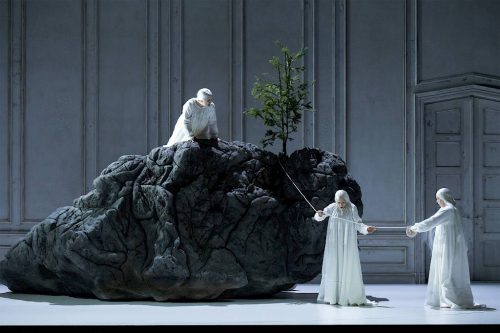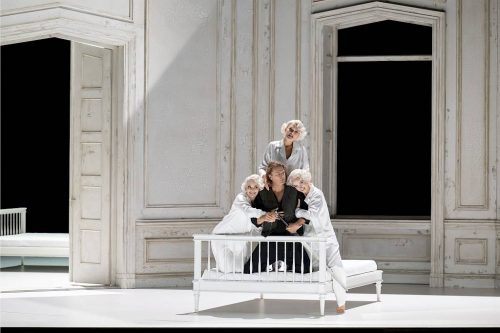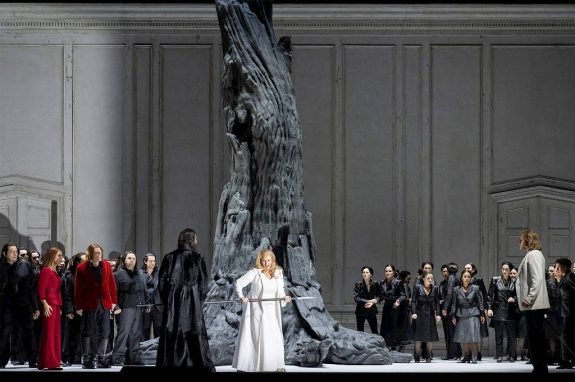 Switzerland Wagner, Götterdämmerung: Soloists, Extras at the Zurich Opera House, Chorus of Zurich Opera, Philharmonia Zürich / Gianandrea Noseda (conductor). Broadcast live (directed by Michael Beyer) from Zurich Opera House, 26.5.2024. (JPr)
Switzerland Wagner, Götterdämmerung: Soloists, Extras at the Zurich Opera House, Chorus of Zurich Opera, Philharmonia Zürich / Gianandrea Noseda (conductor). Broadcast live (directed by Michael Beyer) from Zurich Opera House, 26.5.2024. (JPr)

After three operas there are more questions than answers about Andreas Homoki’s Ring and so far answers have come there none! It is not as if mine are all that deeply philosophical: they are more like, well, why when the First Norn asks in the Prologue ‘What is that Light?’ we don’t see anything in particular; and later in the first act Brϋnnhilde wonders why the flames round her rock are blazing ‘like an angry, fiery wave’ and there isn’t even a red glow? And who did anyone think it was a good idea to have Siegfried put the horse (Grane) helmet on his head and gallop about like a young child on a hobby horse, I repeat, this should not be ‘Wagner für Kinder’. All we are left with is the simple idea that it is just the unfolding of the timeless tale of good (those in white) versus evil (those in black) and the perils of greed.
At the start of Götterdämmerung (for Michael Fischer’s review click here) we are in the palatial villa we have been in from the start of this cycle, the walls are rather more distressed but there is none of the oversized furnishings of Siegfried, so what was that all about? The Norns – Freya Apffelstaedt, Lena Sutor-Wernich (an ear-catching genuine contralto) and Giselle Allen are, older now, platinum blondes unspooling their thin rope back and forth across the stage and round Brϋnnhilde’s large rock. When the rope of fate splits and they descend ‘Zur Mutter!’ it has finally dawned (!) on me how Gianandrea Noseda’s Wagner is at its best when there is no singing; in the ‘bleeding chunks’ moments, beginning with, well, ‘Dawn’ and soon a surging ‘Siegfried’s Rhine Journey (with a virtuosic, ringing offstage horn call) through to the Funeral Music. This idea seemed confirmed by the curtain falling between almost every scene and often during some of them to show us the conductor and the excellent orchestra during the livestream. To Noseda’s credit it did sound – through loudspeakers – that he let his musicians off the leash more than in the previous operas and the performance was all the better for it.
Act I begins with Siegfried and Brϋnnhilde on their bed (as at the end of Siegfried). Initially it looked as if she couldn’t get rid of him quick enough on his quest for deeds of glory. Off he went eventually though he forgot his sword (again!) for a short while. Another of the curtain drops and rises revealed the Gibichung Hall with more modern furniture than we had previously seen and Gunther and Gutrune in identical outfits including red jackets and Hagen looking like Rasputin in black (naturally!) and with a chainmail vest. Siegfried enters through the window and the scene plays out as you might expect with the swearing of blood-brotherhood involving Hagen’s drinking horn (that was also involved in drugging Siegfried so he forgets Brϋnnhilde). Throughout the opera Gunther and Gutrune are very close and seemingly reluctant to be separated. Hagen ends singing his ‘Watch’ by the huge tree trunk from Die Walkϋre
Back in Brünnhilde’s bedroom Waltraute slides in with her horse’s helmet, shield and spear. As if we are not able to understand what Waltraute’s ‘Narration’ tells us we are shown Wotan slumped at his dining table with Freia’s golden apples lined up uneaten and Tieni Burkhalter’s video showing ravens flying off. After Waltraute leaves the doors lock on Brϋnnhilde and Siegfried as Gunther (?) first sings offstage, eventually Gunther enters as an avatar, as well as Siegfried with the Tarnhelm on his head. As he struggles with Brünnhilde over the ring the Tarnhelm gets pulled off and she recognises Siegfried.
Noseda and the orchestra brought no great sense of foreboding to the Prelude to Act II and the following scene was oddly staged with no sense that Alberich was appearing to a sleeping Hagen. Once again why does the curtain need to come down? It rises to find Hagen at a shiny, if plain, black table that Siegfried and Gutrune will soon get all handsy on. Hagen is back at the tree for his ‘Ruf’ and the men of the chorus (on stentorian form) turn up to mill around almost as clones of Hagen himself. After her entry Brϋnnhilde stomps about full of righteous anger and jealousy over Siegfried’s perceived betrayal. The contradictory oath swearing takes place on Hagen’s spear but the incident at the end of Act I does explain Siegfried claiming how the Tarnhelm ‘only partially disguised me’. To their credit the ‘Vengeance Trio’ was splendidly sung by Camilla Nylund (Brϋnnhilde), David Leigh (Hagen) and Daniel Schmutzhard (Gunther).

For the opening of Act III, we return to the bedrooms of the three Marilyn Monroe-lookalikes we first saw in Das Rheingold, Siegfried (now mostly dressed in black) comes through the window and cavorts on a bed with these Rhinemaidens but refuses to give them the ring they want. Cue more animated ravens as Hagen soon despatches Siegfried with his spear in a room with three tree stumps before Siegfried dies on the bed he shared with Brϋnnhilde. Gutrune is in a scarlet nightdress and gown and is distraught at the sight of the dead Siegfried on the table and after arguing with Hagen over the ring Gunther walks into his spear. A feature of this Ring has been that no one is ever still for any length of time but as Brϋnnhilde begins ‘Starke Scheite schichtet mir dort’ everyone is for once.
It all ends puzzlingly with Siegfried resurrecting on the bed, handing Brϋnnhilde the ring and they have a final kiss at ‘Ruhe, ruhe, du Gott!’ Then we see the three Rhinemaidens too eager for their Rhinegold, before the staging actually manages some smoke and a red glow and the toing and froing resumes. Up and down, up and down, up and down annoyingly goes the curtain and we see Hagen thrown out of a window by the Rhinemaidens; Wotan in a chair with his spear in splinters watching his portrait of Valhalla now shown in flames; and finally, the rooms we have become familiar with are completely empty. And that is that …
Klaus Florian Vogt will sing Siegfried at Bayreuth in their Ring cycle for the first time this summer so seems determined to continue with this new role. I suppose this is due to his popularity as a singer there and the current dearth of really good Siegfrieds. I do hope he might try to sing the role as written in Götterdämmerung. Please let me know if I am wrong but I think there are three high Cs in the opera; at the end of the first act duet matching Brϋnnhilde’s, in Act II in the florid passage as he goes off to the wedding feast and then when greeting Hagen and the vassals in Act III. I don’t think Vogt attempted any of them. Would a singer who didn’t reach the high note in ‘Nessun dorma’ get the standing ovation Vogt got for Siegfried in Zurich. I think he is a wonderful Lohengrin and Walther von Stolzing, but he does not rate highly for me as Siegfried with his slightly monochrome singing and constant wide-eyed wonderment.
However, both Vogt and Camilla Nylund were at their best for me in their closing moments: Vogt with a deeply affecting ‘Death’ and an exalted farewell and Nylund with a suitably incandescent Immolation Scene with all registers of her voice in focus. In fact, there had been some lovely, quietly reflective, singing from Nylund at the end of Act II but the main problem was her voice spreading under pressure.
In the ungrateful roles of Gunther and Gutrune Daniel Schmutzhard and Lauren Fagan had stronger voices – at least through my loudspeakers – than you usually hear and sang well. I repeat the word cavernous for David Leigh’s booming bass voice and he was an even more two-dimensionally demonic Hagen than we sometimes see. I also repeat my comments in the other reviews about Christopher Purves’s Alberich, his artistry is plain to see but he sings Alberich almost too beautifully for me. Sarah Ferede was an emotionally charged Waltraute and Uliana Alexyuk (Woglinde), Niamh O’Sullivan (Wellgunde) and Siena Licht Miller (Flosshilde) were an appealing trio of Rhinemaidens and harmonised well.
Was it worth all the effort, well if you have seen it, or get to see it, please tell me.
Jim Pritchard
Featured Image: Lauren Fagan (Gutrune), Daniel Schmutzhard (Gunther), David Leigh (Hagen), Camilla Nylund (Brünnhilde) and Klaus Florian Vogt (Siegfried) © Monika Ritterhaus
For further Zurich Ring reviews click here.
Creatives:
Producer – Andreas Homoki
Set and Costume design – Christian Schmidt
Assistant Artistic stage designer – Florian Schaaf
Lighting designer – Franck Evin
Video designer – Tieni Burkhalter
Dramaturgy – Werner Hintze, Beate Breidenbach
Chorus master – Ernst Raffelsberger
Cast:
Siegfried – Klaus Florian Vogt
Gunther – Daniel Schmutzhard
Alberich – Christopher Purves
Hagen – David Leigh
Brünnhilde – Camilla Nylund
Gutrune – Lauren Fagan
Waltraute – Sarah Ferede
First Norn – Freya Apffelstaedt
Second Norn – Lena Sutor-Wernich
Third Norn – Giselle Allen
Woglinde – Uliana Alexyuk
Wellgunde – Niamh O’Sullivan
Flosshilde – Siena Licht Miller
Wotan – Wolfram Schneider-Lastin

A slightly delayed reply, mainly because I took a digital detour to Madrid for a rather poor Meistersinger. Well, was it worth it? Yes, for me. I liked the straightforward production that had little of the pretension and idée fixe of the Herheim and Tcherniakov productions in Berlin. I didn’t mind the drop curtain which I thought was a way of suggesting tableau vivants. I suppose we saw maybe a touch too much Noseda and the orchestra but they deserved it. I really did like Vogt. He may not have a Siegfried voice but he sings it well to my ignorant ear. And certainly better than most of the others who struggle with this impossible role. The size of the theatre helped but I think he deserved his ovation. Nylund reminded me of Gwyneth Jones, including the ‘spread’ but she, again was more appealing than others who are, to be polite, more towards the end of their careers. Horses, or Granes, for courses but I could watch this again and I’m grateful that it was made available to us. It was no effort at all!
Jim Pritchard: Thank you for this well-argued comment and of course views do differ. I have no great love of concepts shoehorned onto the Ring but just felt I needed a little more to engage me for those several hours rather than good v evil and the perils of greed (which I realised I missed off but have added in now). And of course I have seen – maybe like you – a few (for me, possibly too many) Rings! I thought about Gwyneth Jones too and seriously doubt you do have an ‘ignorant ear’!